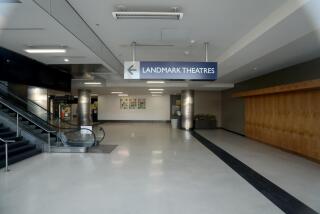WEST ADAMS : Center Makes Sure Charges Are <i> Able</i>
- Share via
Decked out in a pin-stripe suit with a handkerchief carefully folded in the breast pocket, Ronald Taylor passed out resumes and talked up potential employers at a recent job fair with the single-mindedness of someone searching for work in a tough economy.
The fact that he is developmentally disabled didn’t seem to faze Taylor, 27, who describes his inability to read as a temporary condition he is striving to overcome: “The most important thing is that I be independent, be able to take care of myself and not rely on nobody else.”
Taylor and others like him have found encouragement and much more at the South Central Los Angeles Regional Center for Developmentally Disabled Persons, the largest center of its kind catering to the central city. Last week, it celebrated its 20th anniversary with a series of events that included the client job fair, the launching of a parent resource center, and an informational “warmline.”
Director Dexter Henderson said these services, like all offered at the center, were designed with the center’s philosophy of self-reliance in mind. “The goal here is to move all of our consumers from group home to independent living,” he said. “Maximizing everyone’s individual potential is what we’re all about.”
The center, on a tree-lined stretch of Adams Boulevard near Arlington Avenue, serves people with mental retardation, cerebral palsy, epilepsy, autism and other developmental disabilities. It is one of 21 such centers contracted annually by the state Department of Developmental Services. The center covers a sprawling section of the county that encompasses South and Central Los Angeles, the Crenshaw District, and the cities of Lynwood, Compton, Downey and South Gate.
Of all the centers, it has the largest minority clientele--45% black, 38% Latino and 5% Asian--and caters to the communities in greatest need, said Henderson, who says he gets 50 to 60 people seeking help each month.
“Most of the families we serve are not in the information loop that would lead them to places like UCLA Medical Center,” said Henderson, 41. “Some aren’t even aware of their children’s condition.” Families who live in economically depressed areas may be less than supportive of a disabled child financially and otherwise, he added.
The center, said Henderson, serves clients “from the cradle to the grave,” beginning with genetic counseling for mothers-to-be who may be carrying developmentally disabled fetuses, and reaching well into adulthood with life-skill classes and programs aimed at integrating students into mainstream society. Other services include legal and human rights, parent support and rehabilitation.
Henderson said Taylor, who has been coming to the center for eight years, exemplifies the self-help spirit the facility works to instill in clients, whatever their handicaps. “We put him through a program that gave him job-seeking skills, and reinforced the survival skills he already has,” Henderson said. “And with everyone, we focus on the basics: housing, employment, recreation--the things all of us need to feel happy and fulfilled.”
Diana Ccasa Ugalde, a 20-year-old Mexican native with cerebral palsy who has been a client for five years, said the best thing about the center was “meeting all the people who have helped me.”
A feisty high school student who plans to enter Cerritos College and study chemistry next year, Ugalde cannot speak but vigorously types out messages on a portable computer the center provides her.
“My teachers helped me learn this new language,” she wrote. “And I’ve applied to be a consumer member on the center’s board of directors. I’ve learned that just because I don’t talk, I never stop communicating with the people around me.”
More to Read
Sign up for Essential California
The most important California stories and recommendations in your inbox every morning.
You may occasionally receive promotional content from the Los Angeles Times.










